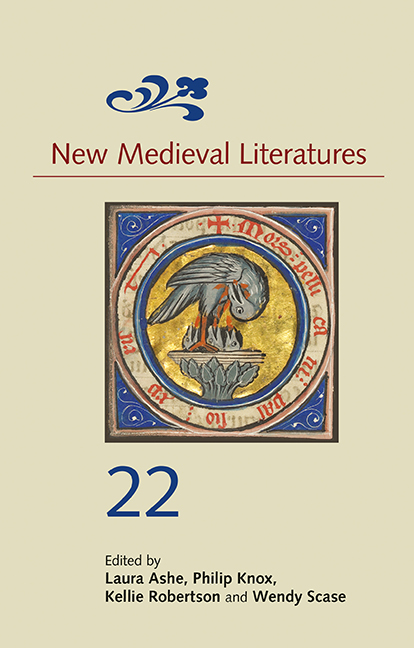Book contents
- Frontmatter
- Contents
- List of Illustrations
- List of Abbreviations
- 1 Touch and Movement in Chrétien de Troyes’s Chevalier de la Charrette
- 2 Cavernous Charisma: The Caves of the Patriarchs at Hebron
- 3 Lawman’s Vision of History: Sources and Figuration in the Brut
- 4 What the Mole Knows: Experience, Exempla, and Interspecies Dialogue in Albert the Great’s De animalibus
- 5 Demonic Prosthesis and the Walking Dead: The Materiality of Chaucer’s Green Yeoman
- 6 Learning to Live in Communities: Household Confession and Medieval Forms of Living
- 7 Alain Chartier’s Quadrilogue invectif and the Poetics of Political Community
- 8 Reginald Pecock’s moral philosophie, and Robert Holcot O.P.: Faith, Probabilism, and ‘Conscience’
- New Medieval Literatures Scholars of Colour Essay Prize
4 - What the Mole Knows: Experience, Exempla, and Interspecies Dialogue in Albert the Great’s De animalibus
Published online by Cambridge University Press: 26 May 2022
- Frontmatter
- Contents
- List of Illustrations
- List of Abbreviations
- 1 Touch and Movement in Chrétien de Troyes’s Chevalier de la Charrette
- 2 Cavernous Charisma: The Caves of the Patriarchs at Hebron
- 3 Lawman’s Vision of History: Sources and Figuration in the Brut
- 4 What the Mole Knows: Experience, Exempla, and Interspecies Dialogue in Albert the Great’s De animalibus
- 5 Demonic Prosthesis and the Walking Dead: The Materiality of Chaucer’s Green Yeoman
- 6 Learning to Live in Communities: Household Confession and Medieval Forms of Living
- 7 Alain Chartier’s Quadrilogue invectif and the Poetics of Political Community
- 8 Reginald Pecock’s moral philosophie, and Robert Holcot O.P.: Faith, Probabilism, and ‘Conscience’
- New Medieval Literatures Scholars of Colour Essay Prize
Summary
In the mid-thirteenth century, a Dominican friar designed an experimental test of a common belief: that ostriches could safely consume iron. As he reports in De animalibus (‘On Animals’), the philosopher known to history as Albert the Great (c.1200–1280) offered several ostriches a choice between iron fragments, bones, and pebbles:
De hac ave dicitur quod ferrum comedat et digerat: sed ego non sum hoc expertus quia ferrum saepius a me pluribus strutionibus obiectum comedere noluerunt. Sed ossa magna ad breves partes truncata et arida et lapides avide comederunt.
(It is said that this bird eats and digests iron. But I have not experienced this to be so, since I have often spread out iron for several ostriches and they have not wanted to eat it. They did greedily eat rocks and large, dry bones that were broken into smaller pieces.)
It is tempting to compare this passage to a modern single-variable experiment, with which it bears several similarities. Much like any scientist might today, Albert attempts to control for variables that are not the focus of his study: the bones are broken into small, edible pieces, presumably to match the sizes of other items, and multiple ostriches are recruited for a series of trials, minimizing the effects of outliers. Indeed, Albert's personal narratives have often fueled what Nigel Harris calls ‘extravagant claims … with regard to the modernity and originality’ of his methods; thus William Wallace describes Albert as ‘one of the outstanding forerunners of modern science’, aligning his emphasis on observation with empiricism.
Yet Albert's experiment is also rooted in methods typical of thirteenth-century philosophy and in long-standing ideas about the dietary habits of ostriches, which persisted for centuries after De animalibus; indeed, many early modern manuscripts depict ostriches with iron objects (figs 4.1, 4.2). The notion that these birds could digest iron dates at least to the ninth century, when a popular Arabic text on animals, Kitāb al-Ḥayawān by al-Jāḥiẓ (776–c.868), described an attempt to feed various items to an ostrich; this test subject willingly consumed metal, although it did not survive the experiment. Despite its divergent conclusions, Albert's experimental report is therefore itself an echo of this authoritative precedent. More broadly, Albert's observations throughout De animalibus are founded on the principles of Aristotelian science, with its emphasis on sense perception.
- Type
- Chapter
- Information
- New Medieval Literatures 22 , pp. 91 - 113Publisher: Boydell & BrewerPrint publication year: 2022



